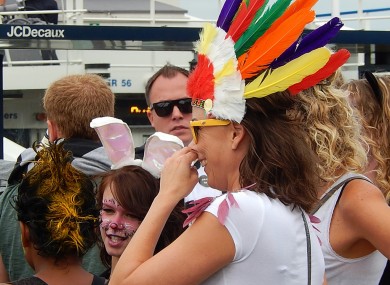
GLASTONBURY FESTIVAL HAVE banned traders at next year’s festival from selling Native American headdresses following pressure from an online petition.
The headwear is a popular festival fashion accessory but has long been the centre of controversy, deemed as offensive and disrespectful by many groups. Musician Pharrell Williams was forced to publicly apologise after wearing the headgear on the cover of Elle magazine earlier this year.
The petition on Change.org was started by Daniel W Round who noted that the “concerning trend has become increasingly prevalent over the past few years at Glastonbury and other music festivals”.
There has long been consensus among indigenous civil rights activists in North America about the wearing of headdresses by non-Natives that it is an offensive and disrespectful form of cultural appropriation, that it homogenises diverse indigenous peoples, and that it perpetuates damaging, archaic and racist stereotypes.
After just 65 signatures, organisers of the festival added the headdress to a list of items banned from sale unless authorisation is given in advance.
Speaking to NME, Emily Eavis, daughter of Glastonbury owner Michael Eavis, said it wasn’t an outright ban, punters can still wear the headgear if they bring it themselves. Still, Round says it’s a success.
Our petition, small in numbers but passionate in support, pushed this issue right up to Emily Eavis, and she listened.
Round now hopes to take the petition to organisers of other festivals across the UK. Bass Coast, a Canadian music festival banned the headdresses altogether earlier this year.










COMMENTS (61)